Peter MALONE
Saturday, 18 September 2021 19:19
Mad Room, The
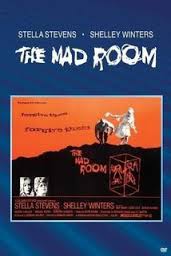
THE MAD ROOM
US, 1969, 93 minutes, Colour.
Shelley Winters, Skip Ward, Stella Stevens, Beverley Garland, Michael Burns.
Directed by Bernard Girard.
The Mad Room is an effective and rather creepy thriller. It is a remake of Ladies in Retirement which was filmed in 1941 with Ida Lupino, Louis Hayward, Evelyn Keyes and Elsa Lanchester. This time Stella Stevens plays the unsteady maid and Shelley Winters plays Mrs Armstrong, the eccentric old lady.
The film builds up its atmosphere, has Stella Stevens going over the top, Shelley Winters also getting a chance to perform in mad style.
The director, Bernard Girard, worked principally in television but made Dead Heat on a Merry- Go- Round for cinemas in the mid-1960s.
1. The significance, the tone of the title? The impact of the horror? Why do horror thrillers appeal to audiences, what conventions did this film use? How well?
2. The style of the credits with their blood and murder, the style of the papers and the information, the flower? How well did this set a tone for the film?
3. The impression of the children? Audience response to them, to them as individuals? The sequence of their training and their coping? Audience awareness of their reputation?
4, How did this contrast with Ellen and her job? How well did the film show Ellen as an ordinary woman doing an ordinary job? Stella Stevens’ style? How eventually true was this? How ironic?
5. Mrs Armstrong as a character? Audience dislike of her? Shelley Winters in this style of role? What qualities of performance made Mrs Armstrong a monster of woman? Did you expect her to be murdered?
6. The job and servants’ work? relationship with Mrs Armstrong? Mrs Armstrong and the memories of her stepson, her charity, society gossips, her friendships? How well were these characters integrated into the plot and to the thriller?
7. The relationship between Helen and her fiance? Conventional romance in the background of a horror thriller? How important was this for the culmination of the film?
8. Helen and her relationship to her brother and sister? The film showing her sense of responsibility for them? Her keeping the information from Mrs Armstrong? How deceptive and ironic was this relationship?
9. The drama of the first meal? The discussion of the need for a mad room, the nature of the mad room?
10. Mrs Armstrong and her discovery of the mad room? The heightening of tension? The explanation?
11. The macabre aspects of Mrs Armstrong's death? the blood and gore, the hand, similarity of the early parents' murder? Audience suspicions?
12. The varying suspicions, the drama of the sequences of getting rid of the body?
13. How convincing was the change in Helen? The blood and the flowers?
14. The dilemma of the brother and sister and their relationship to men? The discovery of Ellen's true motivation?
15. The irony of the dog and the severed hand?
16. The method of the death of the dog and the ending? How appropriate for this kind of film?
17. Was the film too melodramatic or appropriately melodramatic? The use of colour, location and photography? The music, touches of comedy, the minor characters eg, the drunken wife, all combining into effective melodrama?
Published in Movie Reviews
Published in
Movie Reviews
Tagged under
Saturday, 18 September 2021 19:19
Maggie, The
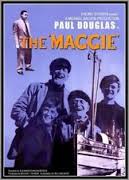
THE MAGGIE
UK, 1954, 92 minutes, Black and white.
Paul Douglas, Alex Mackenzie, James Copeland, Hubert Gregg, Geoffrey Keen, Dorothy Alison, Andrew Keir, Mark Dignam.
Directed by Alexander Mackendrick.
The Maggie is a small, less well-known example of Ealing Studios comedy of the early 1950s. Alexander Mackendrick, American-born, made a number of these films including the very successful Whisky Galore, The Man in the White Suit and The Ladykillers. He was to make The Sweet Smell of Success back in the United States but did not have a flourishing career and made his last film, Don’t Make Waves with Tony Curtis and Claudia Cardinale.
American import, Paul Douglas, appears as an American trying to hire a ship. He is conned into hiring a coal ship which sails up the Scottish coast – there is humorous dialogue, humorous characterisations, especially in the Scottish style.
1. What was the quality of this film? As a drama, comedy, look at Scottish life, human interest?
2. Comment on the quality of the black and white photography? The nature of the dialogue, the use of the Scottish background, dialogue and customs? The quality of the incidents portrayed? The emphasis on Scottish simplicity and shrewdness?
3. What insight into Scotland and the Scots did the film give? Their traditions, the characteristics of their character and temperament? Their attitude towards the law, to leisure, to shrewdness, to sentiment? Their attitudes towards the Americans?
4. Comment on the gentle aspects of Scottish comedy and humour? Comment on the harder aspects of Scottish life: stubbornness, self-centredness, the presumption that others are less good than themselves etc? Which aspect prevailed? How were they embodied in the Captain?
5. How was the Maggie itself central to the film? A symbol of Scotland past and present? Audience attitude towards the Maggie itself? The endearing qualities of a small ship? Yet an unreliable ship? The charm for visitors? The hazards for business? The captain himself and his relationship to the Maggie? His shrewdness, the Captain's outwitting the Americans and the police, his being outwitted? The hard background of his life, his drinking, time meaning nothing, traditions?
6. Should the Maggie have been preserved? The effect of the Maggie on Marshall? on the Captain's sister?
7. How important for the success of the film was the portrayal of Mr Marshall? The American, his understanding of time and money, the big American style, the clash with the Scots, the fact that he was hard done by, the journalists and their curiosity and headlines? the clash with the Captain, the sentiments, the talking with Sheena? How did the Maggie change Marshall's attitude towards life?
8. The comedy and the observation of the Campbells and people who work in Scottish offices?
9. The satire on Puessy and his ineptness? Not being able to control the ship, hiring the Maggie, being caught with the wee boy and the poaching? How did this humour add to the quality of the film?
10. The character of the wee boy? Audience responses to wee boys? His admiration of the Captain, his liking for Marshall. his involvement in the life of the Maggie eg his knocking out Marshall to save the Captain etc?
11. What had been achieved by the end of the film? That insight had been given into the way human nature works and human interactions?
Published in Movie Reviews
Published in
Movie Reviews
Tagged under
Saturday, 18 September 2021 19:19
Magic Box, The/ 1951
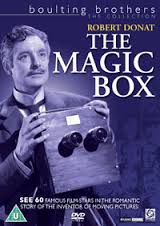
THE MAGIC BOX
UK, 1951, 118 minutes, Colour.
Robert Donat, Margaret Johnston, Maria Schell, Renee Asherson, Richard Attenborough, Robert Beatty, Edward Chapman, Roland Culver, John Howard Davies, Michael Denison, Marjorie Fielding, Robert Flemyng, Leo Genn, Marius Goring, Joyce Grenfell, Kathleen Harrison, William Hartnell, Joan Hickson, Thora Hird, Stanley Holloway, Michael Hordern, Sid James, Glynis Johns, Mervyn Johns, Barry Jones, Miles Malleson, A.E. Matthews, John McCallum?, Laurence Olivier, Cecil Parker, Eric Portman, Dennis Price, Michael Redgrave, Margaret Rutherford, Janette Scott, Ronald Shiner, Sheila Sim, Basil Sydney, Ernest Thesiger, Sybil Thorndike, David Tomlinson, Peter Ustinov, Kay Walsh, Emlyn Williams, Harcourt Williams, Googie Withers, Bernard Miles.
Directed by John Boulting.
The Magic Box was made for the Festival of Britain in 1951, an opportunity to celebrate British film-making and British culture soon after World War Two and its deprivations.
The film is based on a biography of William Friese- Greene, an inventor who worked on movie cameras and was one of the many in the 1880s and 1890s who produced cameras. There is a claim that he was the first to invent the camera. However, this invention is attributed to the Lumiere brothers and to Thomas Edison.
The film is complex in its presentation of Friese- Greene in his old age, his memories and flashbacks. He is preoccupied with his work – and is difficult in his relationships, especially with his wives played by Margaret Johnston and Maria Schell.
The film is of interest because of the many British actors who appeared in cameo roles, for instance Laurence Olivier as a policeman.
The film is colourful, a British memoir, directed by John Boulting of the Boulting Brothers (Brighton Rock, I’m All Right Jack, Heavens Above).
1. The entertainment value of the film? The co-operative work of the British film industry in 1950 for the Festival of Britain? A prestige production of the time? Impact now?
2. The particularly British tone and technique of the film? Colour, music, atmosphere, the numerous British guest stars?
3. The character and importance of William Friese Greene? The fact that he was not in the encyclopaedias, his pioneer work? The credit sequences and the tribute and plaques to so many pioneers of film? His work as a pioneer, scientist, his skill? His status by 1921? 1950? How important was he actually in the emerging film industry?
4. The 1921 opening, his age, his eccentricity, dedication to film experimentation, colour? His encounter with his wife, the reasons for the separation, children? His memories? The importance of the flashbacks to the initial encounter, his working on the machines, his assistant bursting in, the encounter with his wife, outings, proposal? The happiness of their marriage? The need for money, his continued experiments, especially with filters? (The way this was visualised?) The problems, bankruptcy? The effect on the children? The need for money, the things that they had to do without, the reliance on help? The character of Friese Greene, of his wife? His dreams and her ability to share In them, the separation?
5. The transition to the second flashback and his memories of Helen, her personality and charm, her verve? The marriage and the comparison with his second marriage? Her sharing his dreams and his work? The birth of the child? Fifteen years of devoted life? The importance of the experimentation, the development of the machines (the way this was visualised and explained?)? The development of the movie camera and projector? Life in Bath, society, their choral work, the detailed sequences of the rehearsals, the actual night and Friese Greene's forgetting? His talk with his fellow scientists and his enthusiasm? Helen's outburst and accusations of selfishness? Money problems? Helen's illness and concealing it from her husband? The building of the machines, the build-up of his eagerness in succeeding? Filming his uncle in the park? The build-up to the scene where he projects the film, the rushing out to invite the policeman in, the policeman's reaction, wonder at where the images came from, saying that Friese Greene must be pleased? The significance of this period in his life?
6. The 1921 sequences, his attending of the meeting, the discussion about the British film industry, his speech and its significance, that he was unknown, his collapse and death?
7. The importance of the structure and the two flashbacks and the order in which they were presented? How dramatically satisfying though unusual?
8. The history of the development of projectors, celluloid, cameras in the 19th century? Vision, dreams, dedication to dreams? The people involved and the repercussion on others' lives? The film as a satisfying human story?
Published in Movie Reviews
Published in
Movie Reviews
Tagged under
Saturday, 18 September 2021 19:19
Magnificent Ambersons, The
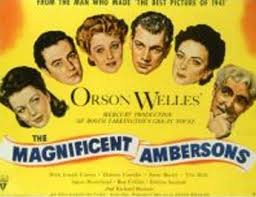
THE MAGNIFICENT AMBERSONS
US, 1942, 88 minutes, Black and white.
Joseph Cotten, Dolores Costello, Anne Baxter, Tim Holt, Agnes Moorehead, Ray Collins, Erskine Sandford, Richard Bennett. Narrated by Orson Welles.
Directed by Orson Welles.
The Magnificent Ambersons is now considered a flawed masterpiece. Originally running at 148 minutes, it was cut for preview to 131 minutes and finally for release to 88 minutes. Despite so many cuts, against director Orson Welles’s wishes, the film was still nominated for best film at the Academy Awards as other nominations.
The film was based on a novel by Booth Tarkington, source of a number of films like Monsieur Beaucaire and, from his Penrod novels, the Doris Day features On Moonlight Bay and By the Light of the Silvery Moon.
Welles uses a number of his regular players, especially from Citizen Kane, released the year before, including Joseph Cotten, Agnes Moorehead and Ray Collins. Dolores Costello is the leading lady, Anne Baxter her rival and, especially, a strong performance by Tim Holt as the very spoilt young man.
The film moves over the decades in its portrait of a wealthy and snobbish family, a young man, played by Joseph Cotten, who wanted to marry the daughter of the family but who marries someone else instead. Later, he pursues her after he becomes a widower and she is interested in marrying him but is attacked by her spoilt son.
The film is a piece of Americana, tracing the atmosphere of rich families in the late 19th century. It is also striking in the style of direction by Welles who had burst on the world of cinema with Citizen Kane and was to make a number of striking films in the 40s and 50s including Journey into Fear, Lady from Shanghai and his versions of Shakespeare, Macbeth and Othello.
1. How well does this film stand as a classic of the forties? Quality of technique and content? Orson Welles and his film-making? The development of the Citizen Kane mystique?
2. How well adapted was the original novel for the screen? The use of Morgan's narrative device? Involvement of the audience in the story via narrative?
3. How significant the presentation of the Ambersons as representing the past? The Morgans representing the future in America? The picture of an American family and its history, representing recent American history? What insight into America and Americans?
4. What comment did the film make on the changes of history, the nature of society and the effect of changes, money, manners, human relationships? The significance of cars as a symbol of the change, the future, materialism?
5. Comment on Orson Welles' cinematic techniques of the use of light and darkness, quality of editing, realistic and symbolic sets?
6. The initial portrayal of the past, the Amberson's house, the quality of society and their manners, the Ambersons and their reputation, people's reactions to them, Morgan's? The disdain of the Ambersons for Morgan?
7. Isobel Amberson and her wilfulness? Rejection of Morgan, motivation for marrying Wilbur? The birth of George, an obnoxious child, people's hostile reaction, George's growing older and his doting mother and father, grandfather?
8. The contribution of the minor characters, the Major, Fanny and her relationship to Isobel, to George? Jack? The Amberson household and servants? What picture of aristocratic American society did this give?
9. How repellent a character was George? His wilfulness as a child? His being spoilt as he grew older? People wanting to see his comeuppance? How much did the audience want to see this?
10. The central focus of Morgan and his love for Isobel? His mistake? His life of marriage and his daughter? A man of the future, inventing cars? The significance of his return, the kind of man he was, his impact on Isobel? His love for Lucy? George's hostility and thwarting his mother's love for Morgan? His hatred of Morgan?
11. The complex relationship between Lucy and George? The fact that it could not come to fruition? The reasons for their relating well? The possibility of love?
12. George as wilful in society? Overspending money? Not taking account of the future?
13. The pathos of Isobel's death? George's hostility? Morgan's sorrow? The repercussions in terms of money?
14. Fanny and her devotion to George? The relationship between the two? What kind of woman was Fanny? How inexplicable? The changes of moods?
15. Fanny's protection of George and caring for him in his difficulties?
16. The theme of money, the Morgans and their having it, Lucy’s wanting to help George? George's losing it and searching for a job? His accident? His need for forgiveness?
17. How interesting a drama of human relationships? How interesting a development of the themes of history, change, society, Americanism?
Published in Movie Reviews
Published in
Movie Reviews
Tagged under
Saturday, 18 September 2021 19:19
Magnificent Matador, The
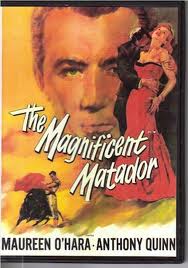
THE MAGNIFICENT MATADOR
US, 1955, 94 minutes, Colour.
Anthony Quinn, Maureen O’ Hara, Manuel Rojas, Richard Denning, Lola Albright.
Directed by Budd Boetticher.
The Magnificent Matador is a bullfighting film made by Budd Boetticher who had a continued interest in this sport over decades. He first manifested it in film in The Bullfighter and the Lady in 1951. This film is very similar in story
plot, treatment and characterisation. This film had a bigger budget, more important stars with Anthony Quinn and Maureen O’ Hara and also was made in colour.
Audiences who are interested in bullfighting will find it an engrossing drama. Those who are critical of bullfighting will also find it interesting because the film does give both sides of the issues. Anthony Quinn at this time was at a peak in his career having con an Oscar for Viva Zapata and was about to win another one for Lust for Life.
Boetticher was then to go on to make a series of B grade westerns which were popular in their way and which many critics, especially the French, consider as most important,
1. Did this film hold audience interest? Why? How enjoyable was it? How successful a film? With B grade budget how much value did it have?
2. What is the audience response to Mexico and its backgrounds? Why? How well were they used here?
3. What is audience response to bull-fighting and the arena? Why? Did the film show well the pros and cons of this way of life? Its impact on Mexican peoples? The glamour, the skill? the reputations?
4. How did the film gain audience interest with its basic puzzle about the behaviour about the matador? Did it take the audience with it and give them a satisfactory answer? On the level of understanding and of feeling?
5. How could the audience enter the story via the heroine? An attractive woman on herself, her romantic ideas about matadors, her following the matador, her helping him, her interventions, his trusting her, the outsider looking at the Mexicans, her clash with Richard Denning? The resolution at the end?
6. How did the film focus on the matador himself? Anthony Quinn's style and performance, seeing him at prayers his omens and prayers, his running away, the impact of the car-chase, his accepting the heroine's offers, hiding, accepting taunts, finding out the truth, his naivety about his son, his final confronting the people, their response to him, the bull-fighting success?
7. How well portrayed were the minor characters - were they
interesting or conventional? The American hanger-on who is nasty, drunks telling the press? The friendly couple who put people off? The Mexican landowner who has supported the matador etc?
8. How convincing was the portrayal of the son? His ambitions? His relationship with his father? His final success? What did the film have to say about skill and achievement, ageing, the generations and the clash and co-operation? Was this well portrayed?
10. After this discussion, can this film stand as a successful and important bullfight film?
Published in Movie Reviews
Published in
Movie Reviews
Tagged under
Saturday, 18 September 2021 19:19
Magnificent Obsession
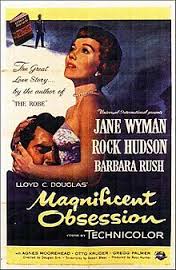
MAGNIFICENT OBSESSION
US, 1954, 108 minutes, Colour.
Jane Wyman, Rock Hudson, Barbara Rush, Agnes Moorehead, Otto Kruger.
Directed by Douglas Sirk.
Magnificent Obsession is based on a novel by Lloyd C. Douglas, author of The Robe. It was already filmed by John M. Stahl, veteran director of a number of soap opera-style popular novels like Imitation of Life and Back Street, with Irene Dunne and a young Robert Taylor.
This film is given the full lush Universal Studios treatment of the mid-1950s. Jane Wyman was a popular actress, had won an Oscar for Johnny Belinda, and plays Helen Phillips very well and persuasively. The up-and-coming Rock Hudson plays the young doctor who is responsible for the car accident and the blinding of Helen and who then studies, gives himself to the helping of Helen to regain her sight and, of course, falling in love. Barbara Rush plays Jane Wyman’s sister.
The film was directed by Douglas Sirk who had come from Nazi Germany in the 1930s, had made a number of popular films in the United States, concentrating in the early 1950s on B-budget films, especially westerns and musicals. However, with this film he made a breakthrough and established a reputation with such films as All That Heaven Allows (with Wyman and Hudson), Written on the Wind for which Dorothy Malone won an Oscar, Imitation of Life.
Much admired in later decades, his style was imitated by Todd Haynes in the tribute film, Far From Heaven, with Julianne Moore and Dennis Quaid.
This is probably the classic weepy of the first half of the 1950s.
1. The status of the story as a Lloyd C. Douglas novel, the various film versions? Women's pictures, from the thirties to the fifties? The particular ingredients, design, aiming at feminine sensibility? Was this film a success within this tradition?
2. The production values, colour, musical score, stars? A wealthy world, glossy treatment, lush overtones? A real world or a fantasy world? A world of wish fulfilment?
3. The basic appeal of the plot in terms of romance, service? How interesting a plot? A masculine response, feminine response? The interplay of the stars within this context?
4. How important was the plausibility of the plot in terms of realism? The plausibility in terms of symbols of good, sin, repentance, dedication? Did the film work on this level?
5. Audience response to the opening and the situation of Dr Phillips' death? Sharing the desperation and the frustration of Helen and Joyce? Reaction to Bob Merrick as a selfish playboy? A means of introducing the characters, taking point of view, gearing an emotional response? The relationship of
emotional response to judgment of characters and actions?
6. The Rock Hudson hero in Bob? The wealthy type, his way of life, irresponsible values? The accident? His feelings at the death of Dr Phillips, his trying to offer sympathy to the Sisters? His continued pursuit of Helen and ultimately
being responsible for her blindness? irresponsibility?
7. The importance of the character of Randolph and his optimistic philosophy of life? The magnificent obsession and dedication? How credible is this philosophy, how religious, how realistically optimistic? This making the film a kind of quest for Bob Merrick? How edifying, how moralising?
Preaching?
8. Bob and his attempts to put this into practice and the further danger for Helen in her blindness?
9. Helen and the result of her accident? Her attitude towards Bob Merrick? Her gradual acceptance of her blindness? and audience sympathy and feeling for her? The sequences of the beach, reading? Her encountering Bob as an anonymous friend? The effect of the friendship and the change into love?
When did she realise that it was Bob?
10. Joyce as a character contrasting with her sister? Hostility towards Bob, only concealing the truth for love of her sister? Nancy Ashford as the ironic companion? Support for Helen? For Bob? Her contribution to the plot and atmosphere?
11. The importance of Bob's attempts at dedication, first of all through money? Paying for Helen's treatment? The gradual communication, the letters? The blossoming of the love, the telling of the truth, the meeting? The importance of the European settings?
12. Her disappearance? The effect on Bob, the effect on Helen? The importance for Bob that be make something of his life, his return to the medical profession, skills? (Credible in itself, for the purposes of the plot and the message?)
13. The passing of the years and the effect that this has on an audience and their hopes? Helen's reappearance, illness, the coincidences? The build-up to the final operation and the fulfilment of the obsession?
14. The value of emotional involvement, tears? The world of feeling, judgment? how optimistic is a film of this kind?
Published in Movie Reviews
Published in
Movie Reviews
Tagged under
Saturday, 18 September 2021 19:19
Magnificent Yankee, The
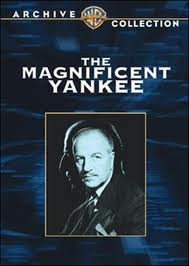
THE MAGNIFICENT YANKEE
US, 1950, 89 minutes, Black and white.
Louis Calhern, Ann Harding, Eduard Franz, Philip Ober, Richard Anderson.
Directed by John Sturges.
The Magnificent Yankee is American jurist and Supreme Court judge, Oliver Wendell Holmes. The film is based on a play from Broadway which starred Louis Calhern and MGM bought the rights to feature him in the film version. He had played a character actor in the 1930s at Warner Bros (The Story of Emile Zola) and had appeared in many MGM films (playing Buffalo Bill in Annie Get Your Gun in the same year as The Magnificent Yankee). He was to be Julius Caesar in Joseph L. Mankiewicz’s version.
Ann Harding plays his wife, Eduard Franz plays noted judge Louis Brandeis. Philip Ober plays the novelist (The Virginian) Owen Wister and narrates the film.
The film is an opportunity for American audiences to reflect on the Declaration of Independence, the rights that American citizens have – and, to that extent, it is interesting for non-Americans to understand something of American law and American jurisprudence.
The film is also of interest to film buffs because it was an early film directed by John Sturges. During these years he made a number of small-budget films like this, gradually making bigger-budget films and growing in reputation. He broke through with Bad Day at Black Rock in 1955 then with Gunfight at the OK Corral in 1957. After that he made a number of significant films including The Old Man and the Sea, The Magnificent Seven, The Great Escape. He went back to the OK Corral for the 1967 Hour of the Gun. His last film was another action film, based on Jack Higgins’ The Eagle Has Landed.
1. The quality and standard of this film, its appeal, to Americans, to non-Americans? Its status as a supporting film yet Its Oscar nomination for the main actor?
2. How effective was the film even in its brevity? Black and white photography, re-creation of Washington at the turn of the century? The atmosphere of American politics and law? American character?
3. Audience interest in biography: the person, his personality and career, law and justice, an American hero?
3. The reputation of Oliver Wendell Holmes? His heritage in law and the administration of justice in America? American respect for him? Was the film an adequately respectful biography?
5. The quality of Louis Calhern's portrayal? A portrait of the character, a study of the character, enabling audiences to understand what kind of a man Holmes was? How well did he do this?
6. His qualities of character as portrayed, his personality, loyalty, legal skill, knowledge? His private life and his relationship with his wife? The importance of the succession of assistants, their being sons to him? The importance of this theme and the way it was illustrated? Their similarities, the change in the times? Their reunion? Their loyalty?
7. How interestingly did the film portray his work, his administration? The court sequences? His study and the human effort he put in to give a just decision?
8. The portrayal of his friends, associates? A man who moved in high places?
9. The significance of his friend Louis and the Jewish question? How well was this treated, the achievement as regards administration, legal prejudice?
10. The humour of his quirks, mannerisms, habits? Their permanence and their change over the years?
11. How admirable a person was Fanny, her support and understanding of her husband, her death?
12. The achievement of Oliver Wendell Holmes? What could he look back on over his life? The values that he stood for, his
contribution to America, its heritage and tradition?
Published in Movie Reviews
Published in
Movie Reviews
Tagged under
Saturday, 18 September 2021 19:19
Main Actor, The
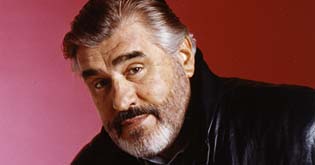
THE MAIN ACTOR
Germany, 1977, 91 minutes, Colour.
Mario Adorf.
Directed by Reinhard Hauff.
A German film made by director Reinhardt Hauff. He had made a film using such a boy as Pape in this film and something of the same consequences had occurred. The director is now interpreting his experience and confessing to failure. The result is an engrossing drama in itself about German social situations as well an film-making. It is also an interesting confession by the director himself.
1. Interesting, entertaining? For a German audience, universal audience?
2. The realism of the presentation of characters, issues, the relationship between film-making and real life? The realism of the themes, the way they were contrived for film communication?
3. The drab world of Pape? The morose character within this world? Exploited by society, exploited by the film-maker? Learning how to exploit others? The film as a critique of this kind of world? The director's own confession about his previous film? How was he atoning by making this film, confessing to failure, self-critique, critique of society, of film-making?
4. The style, atmosphere of Germany and the town, the house, people, the film studios, work in the city, the premiere? The musical score?
5. The theme of film-making - reality and unreality? The world of the film-maker, of the film star? The significance of the title? The effect of the film-making on Pape, on his father, on Max? On the audience?
6. The tone of the opening, presuppositions about the issues? How well drawn was the character of Pape, at home, his involvement in the film, the filming of the sequences? The effect on him of his participation in the film?
7. How strongly emphasized was the relationship of Pape with his father? The brutality of the way of life, aimless? Love, lack of love? The character of the father and his influence on Pape and his actions?
8. The effect of the film on Pape, reliving his life? Understanding it? Being exploited? The effect on the father and his interest in finance etc.? The effect on the whole family?
9. The picture of Max, the competent film director, his skill in his work? His patience in making the film, in directing Pape? How much was he using Pape? The consequences of this? His own involvement, helping the boy, trying to cope, confronting him with his ingratitude, did he have any other option?
10. How did Pape change from the film experience? Working in the city, with Willi? The sabotage, the running away? The returning to the premiere?
11. Audience judgment on how Max could have coped with him? The response to his erratic behaviour? Jobs?
12. The phrase "my film" - as spoken by Pape, with reference to Max?
13. The importance of the sub-plot with the reporter, the presentation of the media, critique, newspapermen on the make? The money issue? Pape exploiting Max?
14. The build-up to the premiere, the film being finished on time, Max's attitude, Pape, the sabotage?
15. The consequent alienation and Pape's indefinite future? How appropriate for the film to end with such a question? What was the audience left with? Understanding, interpretation?
Published in Movie Reviews
Published in
Movie Reviews
Tagged under
Saturday, 18 September 2021 19:19
Man Could Get Killed, A
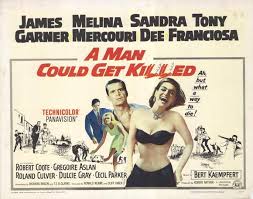
A MAN COULD GET KILLED
US, 1966. 97 minutes, Colour.
James Garner, Melina Mercouri, Sandra Dee, Anthony Franciosa, Robert Coote, Roland Culver, Gregoire Asland, Cecil Parker, Dulcie Gray, Martin Benson, Niall MacGinnis?.
Directed by Ronald Neame, Cliff Owen.
A Man Could Get Killed is an amiably forgettable caper film of the 1960s. However, while it is on screen it is very entertaining. James Garner gives his typical performance as someone investigating lost jewellery, hired by Melina Mercouri (who had made such an impact in such films as Never On Sunday and Topkapi, wife of director Jules Dassin, later a member of the Greek parliament). The supporting cast is led by Sandra Dee and has quite a number of British character actors like Robert Coote, Roland Culver, Dulcie Gray and the inimitable Cecil Parker.
The film is done in 60s style – from a script co-written by T.E.B. Clarke, British author of such films as The Lavender Hill Mob. It was directed by David Lean’s editor, Ronald Neame who had made a number of films in Britain in the 1950s including The Card and The Horse’s Mouth with Alec Guinness. Moving to the United States he made this film, Gambit with Michael Caine and Shirley MacLaine? and was soon to make The Poseidon Adventure and The Odessa File.
The best-known aspect of the film is the final credits song, ‘Strangers in the Night’, sung by Frank Sinatra.
1. A good comedy drama? A spy spoof of the sixties? Echoing the styles and impact of the sixties? Now?
2. The irony of the title and its setting the tone? The hero's reaction to deaths and his possibility of being killed? The importance of the sets, Portuguese locations, the international stars, music, etc.?
3. How important is it to spoof current genres? The quality of this film as a spoof of spy epics? The details of the plot, the types and characters, the mystery of the death, the nature of the chases, the use of care and gadgetry, the build-up towards the climax, the searches? The deadpan irony of the dialogue to highlight this?
4. The importance of the opening and its tone, Beddoes involved in a strange experience? His greater involvement, the continued build-up, his wanting to dissociate himself, everybody forcing him into a pattern? The necessity for its being sorted out? Audience involvement along with Beddoes?
5. How enjoyable was Beddoes as the hero of this kind of film? James Garner and his kind of hero? The American type, the qualities of his character, his growing involvement in the plot, his resources and resourcefulness? The possibility of his being killed? His relating to people, involvement in the chase and dangers? The build-up to the end? What kind of hero did he emerge as? Why?
6. The contrast with Aurora? Was she the heroine of the film? The Melina Mercouri type? Her grief and winking at the funeral? The quality of her life? The good-bad heroine? The vivacity of her personality? Her involvement in the plot, her grasp of the facts, participating in the adventures with Beddoes? The dangers, the exaggerated comedy of the dangers? The ending? Would she have a future with Beddoes?
7. The contrast of the farce with Steve Antonio? The American with the Portuguese pose? The professional who is not quite as good as he thinks? The chance meeting with Amy? Amy as the ingenuous American on tour? Her support of Steve an well as her disappointment? The detailed involvement of the couple? Their growing in love?
8. The film's gallery of crooks and international spies? Their visual appearance, sinister styles, following one another? Their deaths? The satire on this kind of villain?
9. The presentation of the British, the types, mocking them? The Ambassador, the public servants. the Intelligence agents? The retired doctors, etc.?
10. How enjoyable were particular incidents, their integration into the plot, their build-up towards the solution? The mock nature of searching the rice, the car chases?
11. How important were the spectacular chases? The discovery of the dead spies in the various care on the hillside? Steve . Antonio, and Amy in the fridge etc.?
12. Why are such films enjoyable? The presuppositions about heroism and human nature? Laughing at human nature and learning about it in this way?
Published in Movie Reviews
Published in
Movie Reviews
Tagged under
Saturday, 18 September 2021 19:19
Man Called Sledge, A
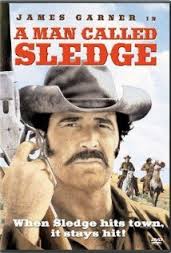
A MAN CALLED SLEDGE
Italy, 1970, 93 minutes, Colour.
James Garner, Dennis Weaver, Claude Akins, John Marley, Laura Antonelli, Laura Betti.
Directed by Vic Morrow.
A Man Called Sledge is an upmarket spaghetti western with an above-average cast. During the 1960s, James Garner had projected a very genial image, even in such action films as The Great Escape. At this time he appeared, most genially, in Support Your Local Sheriff and Support Your Local Gunfighter. However, in this film he portrays a brutal robber, organising a theft of gold from a prison. He has strong support from American character actors as well as two Italian actresses, Laura Antonelli and Laura Betti. The film was directed by Vic Morrow, better known as an actor.
1. The significance of the title with its emphasis on Sledge? James Garner in the role? A hero, a villain, both? Was this a good Western?
2. What conventions of Westerns did the film use, the criminal band, the lure of gold, the plan, its execution, vengeance and murders? The outcome? How different from the conventional Western?
3. The importance of wide screen colour photography, the Western locations, town and desert, the prison? The musical background and its atmosphere?
4. Comment on the special effects, especially in the robbery and the siege.
5. How conventional a plot? The conventional band of criminals in the desert, their motivation? The plan and the lure of gold? The originality of their plan to get the gold? Its execution and the excitement? Sledge and his killing of his accomplices? The playing cards and the vengeance, the collage of images during these games of chance? What did the moralizing song about the gold add to the film? Did it really turn it into a parable and a symbol of greed?
6. How credible a character was Sledge? The credit sequences and presenting him as a character of the West, his violence, his relationship with Ria? His friendship with his men, the confrontation with the old man and his harshness with him? His dependence on Ward for the execution of the plan? His ruthlessness? His playing off the men against each other? What had he gained at the end? Was there any development of character?
7. The development of character in the minor roles: Ward and his support of Sledge, his acting the part of the Sheriff with all its dangers in the prison, his helping him in the robbery, his death? Hooker and Ripley as ordinary accomplices, greedy? The old man and his greed, his boasting about his memories, a devil figure tempting Sledge to robbery, a weak figure in tears especially during the siege, his being imprisoned, remembering the combination? The revelation of his evil during the card games, the final confrontation with Sledge? The ugliness of the accomplices' plot to rape Ria and use her as a bait for trapping Sledge? Audience reactions to this kind of character?
8. How well planned was the robbery, how exciting its execution, the build-up of details, the violence, the opening of the safe, the massacre as they escaped? The crisis of their being besieged?
9. Was the film in any way memorable? How good an exploration of themes of good and evil, greedy, the lust for gold, man's cruelty to man? Was Sledge meant to be a hero?
Published in Movie Reviews
Published in
Movie Reviews
Tagged under